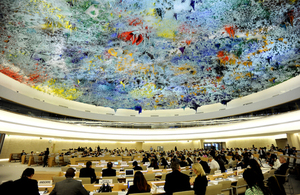-
Plans to enshrine protection of employees from third party harassment in Equality Act
-
GEO launches consultation to ensure laws on sexual harassment are properly protecting victims
-
Victims of sexual harassment asked to weigh in on what action should be taken
Minister for Women and Equalities, Penny Mordaunt, will today (11 July) set out new plans to protect employees across the UK from sexual harassment.
Following scandals such as the Presidents Club dinner, the plans involve provisions to strengthen the law, giving explicit protections to workers against harassment from third parties.
Minister for Women and Equalities, Penny Mordaunt, said:
“Everyone has the right to be treated with respect and dignity, and that includes their time at work.
“The vast majority of employers take their responsibilities towards their staff in this regard seriously, however we know that some employees have not been protected from vile and degrading behaviour towards them.
“I’m determined government makes a lasting change on this issue, clamping down on the individuals that think they can treat people in this way, and empowering the UK workforce to come forward and get the justice they deserve.”
The wider consultation will consider:
-
strengthening and clarifying the law to give explicit protections against third party harassment in the Equality Act 2010
-
how best to ensure that employers take all steps they can to prevent harassment from happening, including considering if a new legal duty is needed
-
the evidence for extending Equality Act 2010 workplace protections to volunteers and interns;
-
whether the three-month time limit for employment tribunal claims under the Equality Act 2010 should be extended.
Matthew Percival, CBI Head of Employment, said:
“Businesses are ready to play their part in tackling sexual harassment at work. They will welcome clarity that employees have rights to protection against harassment by third parties. They can also support a new duty that requires reasonable and proportionate steps to minimise the risk of sexual harassment at work.
“Firms with international operations want to see safe workplaces in all parts of the world. The CBI calls on the Government to ratify the first global convention on violence & harassment at work and encourage others to follow.”
As part of the consultation, the GEO would particularly like to hear from individuals who have experienced sexual harassment at work – so employees are better protected in future.
Sexual harassment has been against the law for decades and strong, clear laws against it are set out in the Equality Act 2010.
Even though these laws are in place, recent reports, including those of the #metoo movement, have shown there is still a real, worrying problem with sexual harassment.
The Consultation will look to identify the best approaches to ending this abhorrent behaviour.
Background:
-
Three months is the standard time limit for bringing a claim to an Employment Tribunal for workplace claims under the Equality Act 2010, although there are some exceptions e.g. for equal pay cases. The three months starts from the date of the act complained of.
-
Until 2018 it was thought that the Equality Act 2010 provided protection in cases of third party harassment, under section 26. However, in May 2018 the Court of Appeal ruled that the Equality Act could no longer be considered to provide protection in cases of third party harassment, establishing key case law in this area.
-
Our consultation proposes to strengthen explicit protections against third party harassment, through the Equality Act 2010. This will allow victims of third party harassment at work i.e. harassment by people like customers or clients, to hold their employer to account if they fail to appropriately protect and support them.
Further Information
The consultation comes a week after the GEO launched ‘Gender equality at all stages: A roadmap for change’. This included commitments to consult on carers rights, an updated online divorce system and piloting different approaches to education about gender roles.
